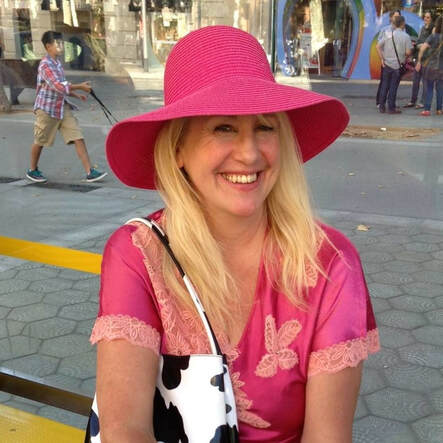
CLAIRE ELIZABETH TERRY, trained in stage-management at the Royal Central School of Speech and Drama, London. She is a descendant of British actress Ellen Terry. After working for several years in British theatre, she became a travel writer. Short-listed for the Shiva Naipaul Memorial Prize, she has also written for the Rough Guides travel series. In 2008 she conceived and edited the book, The Art of Living: A Practical Guide to Being Alive, published by Kairós Publishers in English and Spanish, the profits from which are donated to Green Cross International, the environmental organization founded by Mikhail Gorbachev. The book includes contributions from The Dalai Lama, Michael Douglas, Desmond Tutu, Jean Shinoda Bolen, Masaru Emoto, Richard Branson, and Mikhail Gorbachev among many others. Claire is also the founder and president of the website and not-for-profit of the same name, The Art of Living Guide.
In 2016 she founded the highly-successful Rocaberti Writers' Retreats, held in medieval castles in France, Spain and Italy which match a select group of writers with industry mentors to develop their projects. She is the writer and Executive Producer of the upcoming feature film, Roses, about four friends from all over the world, whose lives are transformed when a rose is secretly drawn for each of the women. In 2018, Claire wrote, directed and produced the short, Thirty Minutes (2020), starring Lúcia Moniz of Love, Actually. For more information on the Rocaberti Writers Retreat, visit their website: https://rocabertiwriters.com.
Dave Watson: What’s new? Your film Thirty Minutes is a widespread hit.
Claire Elizabeth Terry: Thank you! I’m really thrilled with the way it’s being received at festivals. I’m very grateful to have had such a fantastic cast, and also a lovely, very generous crew.
DW: Did you latch onto film early, growing up?
CET: I wouldn’t say that I latched onto film any earlier than anyone else, necessarily, but growing up, my parents used to watch films on Saturday afternoons from the 30s and 40s and I’d watch along with them.
I do remember collecting books in the '70s: they were compilations of old gossip magazines from the 30s and 40s, with columnists like Hedda Hopper - they were absolutely fascinating. Clark Gable was my idol when I was a teenager and so I think I’ve always had very old-fashioned taste in cinema (laughing)!
DW: How did you start working in film? As a writer?
CET: I started working in film only very recently, and that was as a writer. I wrote and directed my first short film, Thirty Minutes, a couple of years ago and wrote my first feature film script, Roses, before that, with George Parra, the Executive Producer of Silver Linings Playbook and Sideways attached to direct.
I also founded the Rocaberti Writers’ Retreat, five years ago. We hold the retreats in medieval castles in France, Spain and Italy, matching a small group of writers with British and Hollywood producers, directors and Academy Award-winning writers to help get their scripts into tip-top shape and ready for market, and also, and very importantly, to make the connections to help them get their projects made.
And - I’m delighted to say! - at least fifteen writers now have their projects in development or out with producers or investors, as a result of the retreats.
DW: Which directors do you most admire?
CET: Debra Granik is simply amazing; her film, Leave No Trace is just sublime and I also love the Japanese director Naomi Kawase (Sweet Bean) for the beautiful, lyrical quality which she brings to her films. I also really admire Clint Eastwood’s work as a director over the last twenty or so years. I love the dreamlike quality of his work in several of his films.
DW: What is Rocaberti about? It endures in the face of the pandemic.
CET: Rocaberti is there to help writers to be proactive in getting their own projects made instead of sitting around hoping to win a contest or hoping a producer will find them, which would be great, obviously, but doesn’t happen very often, unfortunately!
Since the pandemic, we’ve also gone virtual. We have a monthly, online ‘mini-retreat’ called Rocaberti Virtual, and, a couple of writers also now have their projects in development with their mentors, from the virtual retreats, which is great!
We really do have fantastic mentors at both the physical and virtual retreats, such as Jen Grisanti, the writing instructor for NBC’s Writers on the Verge; British producer Joan Lane, who developed The King’s Speech; Richard “RB” Botto, the founder and director of Stage 32; Emmy-nominated writer, Martin Olson; former Disney & Touchstone Exec, Kathie Fong Yoneda; award-winning director, Niall Johnson; screenwriter Diane Drake, who wrote What Women Want and Only You, and Pamela Wallace who won the Academy Award for Witness, amongst many others.
DW: What’s next?
CET: I’ve just finished writing the feature of Thirty Minutes and am aiming to direct that next year. I’m also writing a non-fiction book and we have some exciting new developments happening with Rocaberti too, which will be unveiled shortly.
DW: Finally, do you have a favorite cinematic moment?
CET: Yes, I have many! One that I always remember is from The Purple Rose of Cairo. It’s when Mia Farrow says to a girlfriend, "I just met a wonderful new man. He's fictional, but you can't have everything." I just think it’s hilarious and also very poignant. It’s one of the funniest lines or moments I’ve seen. But there are many, many cinematic moments which have inspired me over the years.
Clip: The Purple Rose of Cairo
Founder and editor of Movies Matter, Dave Watson is a writer and educator in Madison, WI.

